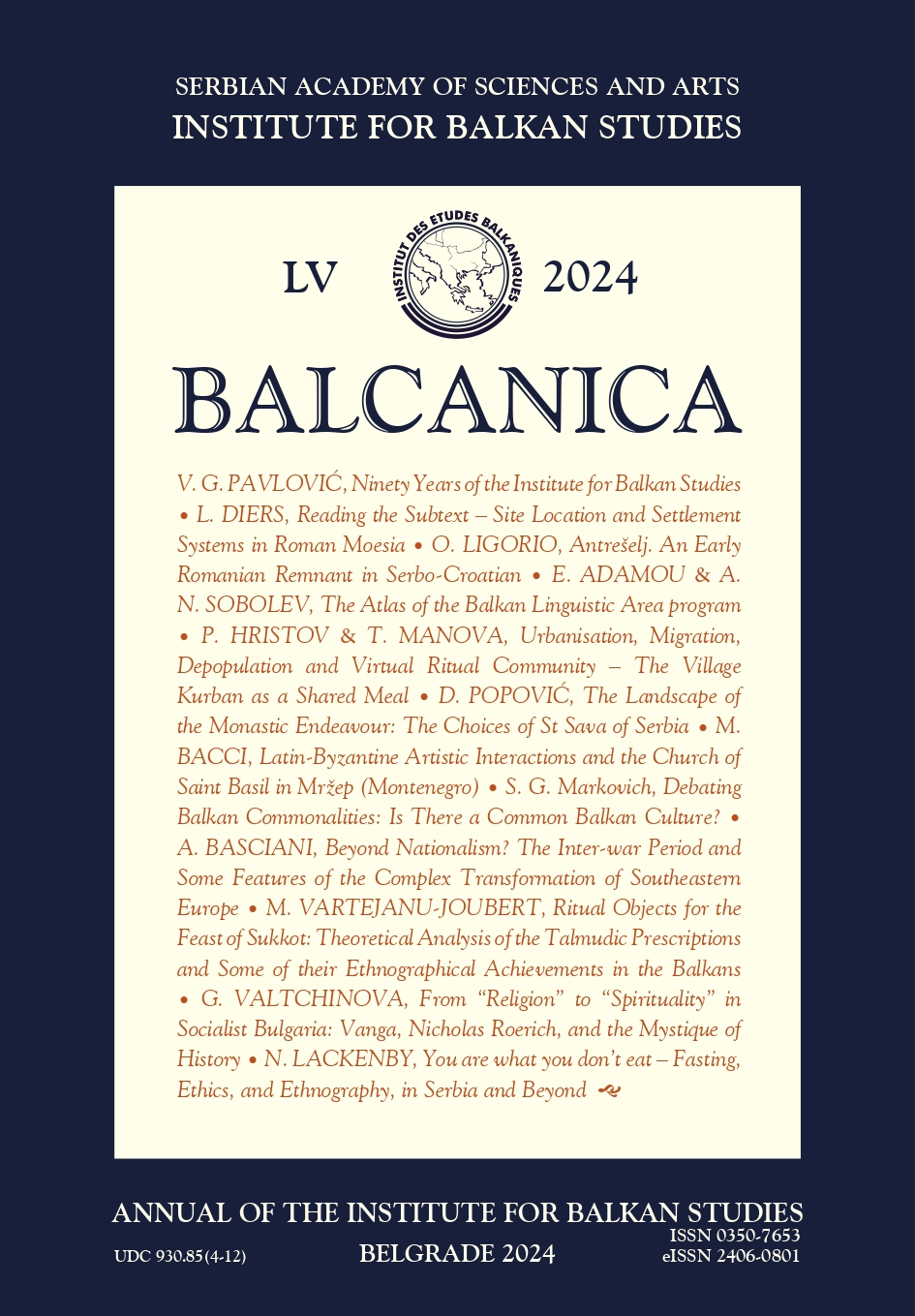From “Religion” to “Spirituality” in Socialist Bulgaria: Vanga, Nicholas Roerich, and the Mystique of History

Published 26.12.2024
Keywords
- Bulgaria,
- India,
- Ljudmila Zhivkova,
- Pythia,
- Roerich
- Russia,
- Vanga,
- ancient civilization,
- clairvoyance,
- history,
- mystique,
- religion,
- spirituality,
- Thracology ...More
How to Cite
Copyright (c) 2024 Balcanica - Annual of the Institute for Balkan Studies

This work is licensed under a Creative Commons Attribution-NonCommercial-NoDerivatives 4.0 International License.
Abstract
The article delves into processes unfolding in Bulgaria in the 1970s, centring around two figures: Vanga, known as the seer of Petrič, and the mystic painter Nicholas Roerich, to demonstrate the changes in the structure and meaning of categories related to religion that occurred in the period of “mature socialism”. The first section looks into the activities of the clairvoyant Vanga and her changing status to uncover the gradual process that transformed her from a local vračka (healer/witch) into the “Bulgarian Pythia”. The second and longest section is dedicated to the Nicholas Roerich Program of 1978, promoted at the highest level in the framework of the celebration of 1300 years of the Bulgarian state, and its impact on coining a peculiar concept of spirituality. The third and final part explores the links between Roerich, Vanga, the notion of spirituality, and a certain vision of history.
Metrics
References
- Atanasova, I. N. “Lyudmila Zhivkova and the Paradox of Ideology and Identity in Communist Bulgaria”. East European Politics and Societies 18, 2 (2004), 278–315.
- Baeva, I., ed. Kulturnoto otvarjane na Bălgarija kăm sveta [The Cultural Opening of Bulgaria to the World]. Sofia: Editions of the University St. Kliment Ohridski, 2013.
- Boyd, J. “In Search of Shambhala? Nicholas Roerich’s 1934–5 Inner Mongolian Expedition”. Inner Asia 14, 2 (2012), 257–277.
- Crampton, R. A Concise History of Bulgaria. Cambridge: Cambridge University Press, 1997.
- Elenkov, I. Kulturnijat front. Bălgarskata kultura prez epohata na komunizma – političesko upravlenie, ideologičeski osnovanija, institucionalni režimi [The Cultural Front. Bulgarian Culture during the Communist Era – Political Management, Ideological Foundations,
- Institutional Regimes]. Sofia: Siela/Institute for the Study of the Recent Past, 2008.
- Fedele, A. Knibbe, K., eds. Gender and Power in Contemporary Spirituality: Ethnographic Approaches. London: Routledge, 2013.
- Gruev, M. “Ljudmila Zhivkova – pătiat kam Agni-Yoga” [Lyudmila Zhivkova – the path to Agni-Yoga]. In Prelomni vremena (In honorem Prof. Ljubomir Ognyanov), 796–815. Sofia: Editions of Sofia University, 2006.
- Ghencheva, Y. “The International Children’s Assembly ‘Banner of Peace’: A Case Study of Childhood under Socialism”. Red Feather Journal 3, 1 (2012), 11–23.
- Hann, C. “Introduction. Social Anthropology and Socialism”. In Socialism: Ideas, Ideologies and Local Practice, ed. Chris M. Hann. London: Routledge, 1993.
- Iliev, I. “The Proper Use of Ancestors”. Ethnologia Balkanica 2 (1998), 7–18.
- Lory, B. L’Europe balkanique. Paris: Ellipses, 1996.
- Mihajlova, V. “Golemijat startov vzriv” [The big explogion of the beginning]. In Kulturnoto otvarjane na Bălgarija kăm sveta, ed. Iskra Baeva, 125–139. Sofia, 2013.
- Marinov, T. “Ancient Thrace in the Modern Imagination: Ideological Aspects of the Construction of Thracian Studies in Southeast Europe (Romania, Greece, Bulgaria)”. In Entangled Histories in the Balkans, eds. R. Daskalov, A. Vezenkov, vol. 3, 10–117. Leiden: Brill, 2015.
- Ostrander, S., Schroeder, L. Psychic Discoveries Behind the Iron Curtain. New York: Bantam Books, 3rd edition, 1970.
- Osterrieder, M. “From Synarchy to Shambhala: The Role of Political Occultism and Social Messianism in the Activities of Nicholas Roerich”. In The New Age of Russia: Occult and Esoteric Dimensions, eds. Birgit Menzel, Michael Hagemeister, Bernice Glatzer Rosenthal, 101–134. Munich: Sagner, 2012.
- Raduychev, I. “Managing Social Relations in a Bulgarian Yoga Group”. In Living and Working in Sofia: Ethnographies of Agency, social relations and livelihood strategies in the capital of Bulgaria, ed. Waltraud Kokot, 57–79. Berlin: LIT, 2012.
- Ragaru, N. “Beyond the Stars: Stars Wars and the Cultural History of Late Socialism in Bulgaria”. Cahiers du monde russe 54, 1–2 (2013), 353–381.
- Savelli, D. « L’Altaï comme champ de transferts religieux selon Nicolas Roerich. Du Shambhala au royaume des Eaux blanches, du bouddhisme à la théosophie ». In La Sibérie comme champ de transferts culturels: De L’Altaï à la Iakoutie, ed. D. Savelli, 183–201. Paris: Demopolis, 2018.
- Sidorov, V. Ljudmila i Vanga [Ljudmila and Vanga]. Sofia: “Reporter”, 1995.
- Trencsényi, B. “Relocating Ithaca: Alternative Antiquities in Modern Bulgarian Political Discourse”. In Multiple Antiquities, Multiple Modernities. Ancient Histories in Nineteenth- Century European Cultures, eds. Gabor Klaniczay, Michael Werner, Otto Gelser, 247–277. Frankfurt: Campus, 2011.
- Verdery, K. What Was Socialism, and What Comes Next? Princeton: Princeton University Press, 1996.
- Valtchinova, G. « Entre religion, tourisme et politique: la naissance du pèlerinage de Rupite, Bulgarie ». Ethnologie Française 28, 3 (1998), 396–405.
- Valtchinova, G. « Vanga, la ‘Pythie bulgare’: idées et usages de l’Antiquité en Bulgarie socialiste ». Dialogues d’histoire ancienne 31, 1 (2005), 93–127.
- Valtchinova, G. “Between Ordinary pain and Extraordinary Knowledge: The Seer Vanga in the Everyday Life of Bulgarians during Socialism (1960s–1970s)”. Aspasia 3 (2009), 106–130.
- Valtchinova, G. “Constructing the Bulgarian Pythia: the seer Vanga between religion, memory, and history”. In Saints, Places, and national Imagination. Historical Anthropology of Religious Life in the Balkans, 209–228. Istanbul: The Isis Press, 2019.
- Znamenski, A. Red Shambhala: Magic, Prophecy, and Geopolitics in the Heart of Asia. Wheaton: Quest Books, 2011.

